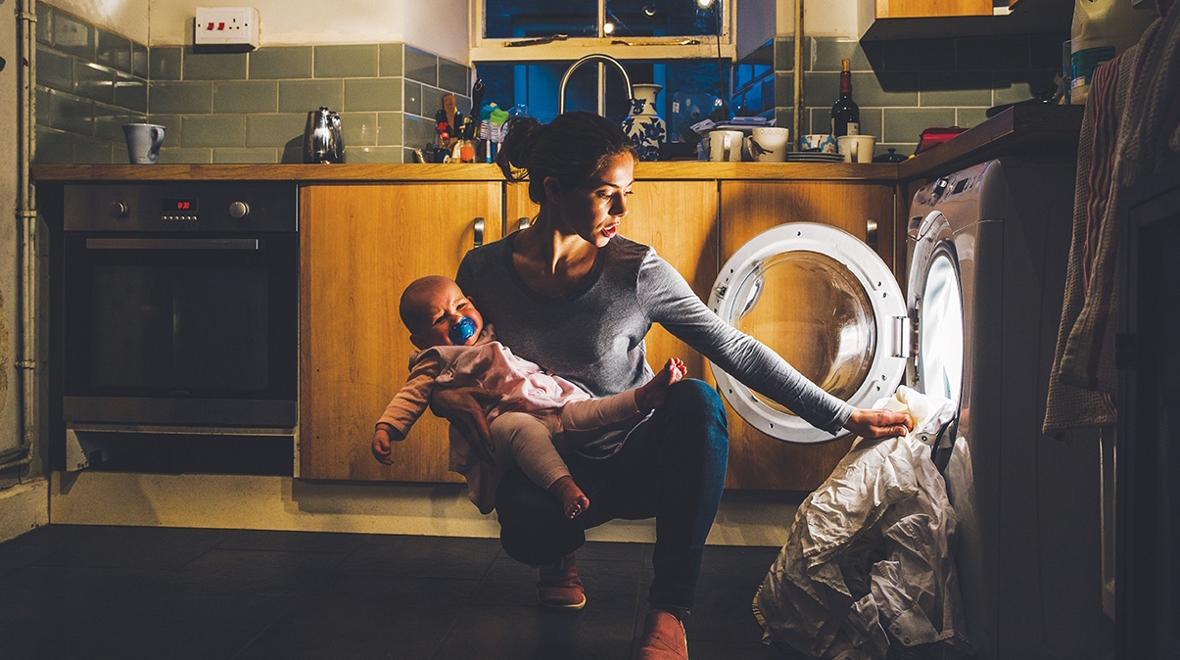
It’s not just the dishes, the laundry, the yard work and the complex extracurricular schedule. The “mom load,” or “invisible load,” that falls on the default parent in some couples extends much deeper, from knowing and buying necessary foods and supplies kids will use to communicating with teachers in a way that keeps a child’s education on track. It’s medication refills and doctor appointments, troubleshooting social issues with friends, scheduling playdates and sending in that daggone field trip money on time.
The ‘invisible load’ defined
But the “invisible family load” is not just a term you hear stressed-out parents complaining about in the carpool line. It’s a real, research-backed concept that refers to the “managerial, cognitive and emotional” aspects of raising a family and running a household. The construct has been gaining steam in recent years, especially during the pandemic, when systemic and societal issues and expectations became much more glaring, especially for mothers.
Just months before the pandemic, Eve Rodsky wrote a book titled “Fair Play,” which was turned into a Netflix documentary of the same name. It details the problem of invisible family load, and for many default parents, it named the phenomenon they have been feeling for years.
In her book, Rodsky drops readers into her mindset when she describes the moment she gets a text from her husband that reads, “I’m surprised you didn’t get blueberries.” She launches into the cascade of tasks she was doing, including taking time off to connect with one of her children during a stressful time, dropping off packages, returning shoes and working on a client contract. “I was barely holding it together when my husband’s ‘blueberry text’ arrived, and the tears came so fast and furious I had to pull over to the side of the road.” It wasn’t about blueberries, she continues, but about a different vision for how parenting and partnership would go. Instead, she’d ended up as the “she-fault” parent, she writes. “This is not how I envisioned my life — the fulfiller of my family’s smoothie needs.”
The role of the ‘default’ parent
Enter the “default” parent. As Rodsky noted, more often than not, it’s the mother in a heterosexual partnership shouldering the responsibilities, but it varies by family and can be the father instead. Regardless, the “default” parent is the one to whom the extra tasks fall, and often the other partner doesn’t even know the extent of the default parent’s stressors.
Dr. Whitney Casares, pediatrician, founder of Modern Mommy Doc and author of the book “Doing It All,” says that helping the default partner to not carry so much of the load starts with awareness of what both parties are currently doing.
“The default parent is the one who is first in line to take care of the children’s needs and handle the tasks required to maintain a home and family,” says Aaron Steinberg, cofounder of Grow Together, a company working to normalize the struggles relationships undergo during parenthood.
Steinberg explains that you can tell if you are the default parent by asking yourself:
- Do you carry a disproportionate amount of the child caring and home responsibilities?
- If your kid(s) needs something that requires the family routine to be interrupted, is it assumed that you will be the one whose day is altered?
- If your partner is with your child and you’re in another room, will your child come to you instead of asking their other parent?
- Are you the only one who is capable of being with your child(ren) for an overnight or extended period of time?
“It should be said that having a default parent is not necessarily a bad thing. Many folks want to be a default parent, and that structure works best for their family. The question is: Is this a team choice or is it assumed or forced?” For those who don’t want it the way it is, specific strategies can help.

How to equalize the load
Numerous tools exist to try to give families a visual demonstration of the many tasks they do to keep things rolling in the family. Rodsky even made it into a “card game,” which is less of a game and more of a deck of conversation starters, with one task per card. This allows couples to distribute the cards intentionally, and have meaningful conversations about default parenting. But, a simple list works just as well. Here are some additional strategies to share the load.
Become vocal about it
If your partner doesn’t know there’s a problem, that’s likely part of the problem. Casares says she shares her list of to-do’s on a consistent basis. “It can be quick for partners to forget all of the tiny minutiae that you take care of as a default parent,” she says, from signing up from camps to arranging after-school care. “It can be pretty quick to be overlooked that you are doing a lot of that. Don’t be discouraged if you have to continually show your partner.”
Find support among other default parents
You can’t get support for a problem if nobody knows what you are talking about. Casares suggests finding couples who are also struggling with this, so you “aren’t alone and don’t feel crazy. It can also help with gaslighting if your partner denies you are carrying a lot of the mental load.”
Get professional input
If a couple is at odds about dividing the load, Casares says it might be time to get a third party involved to help, whether it’s a therapist, couples counselor or another type of facilitator. Grow Together and some other practitioners and organizations use a checklist system that catalogs all the responsibilities and has a system for dividing them, Steinberg says.
Move past the concept of ‘fairness’
Steinberg says that it’s never going to be perfectly fair, a concept that is “impossible.” The pursuit of that can lead to couples coming up with a variety of “ridiculous schemes to address it,” he says, such as tracking hours on a spreadsheet. But that doesn’t mean people should live in a state of unfair roles. “It’s important for things to feel fair and that you’re on a team and in it together,” he says.
Get real about your communication style
Put yourself in your partner’s place: Would you want to have a conversation with you about this issue? “Look honestly at your communication skills. There is a fork in the road depending on whether you lean superior and condescending or inferior and overly conciliatory in interactions with your partner,” Steinberg says. “Ask a friend who has seen you bicker with your partner, or [ask] your partner. If you lean superior, you should instead become very curious; if you lean inferior, you may need some firmness and more of a ‘standing up for yourself’ vibe.”
Schedule check-ins
If you find conversations that weigh down your mental load infiltrating every aspect of daily life, from bickering about who is picking up the kids to how little time you have to yourself, it’s time to schedule a daily, weekly or monthly check-in. “The Gottman [Institute] has a ‘State of the Union’ meeting about the relationship that happens at a regular interval. We say ‘Family System Check-in,’ and in Fairplay, they redo the card deck. This meeting, usually suggested as a weekly event, allows couples to understand how the other is doing and how things are going generally, and make changes to their system,” says Steinberg.

When one partner won’t try to help the default parent
Unfortunately, there are some parents who aren’t interested in helping the default parent, equalizing the tasks or even discussing these disparities. Casares addresses this issue, explaining that becoming more equal as parents and partners won’t “happen overnight,” and that it’s a systemic problem she’s working on to make her daughters’ lives, and their children’s lives, more equitable.
However, this doesn’t mean that you have to stay in a relationship that is toxic or personally damaging to you. Steinberg says if all else is failing, you have to have some real conversations with yourself about your situation.
“If you’re all out of ideas, your next path would be to put all your cards out on the table in a vulnerable and honest way. How fed up are you, really? Are you considering leaving? What is the impact your partner or the circumstances is having on you, meaning how is this making you feel about yourself? We’re talking about a ‘come to Jesus’ here. Let the tears, overwhelm, fear and frustration flow,” he says. “I know this sounds weird, but ideally you should be willing to leave the relationship. To be clear, I am not a huge fan of divorce and I think people, on average, make that choice way too soon, but it is a boundary that can inhibit change. If you are not willing to leave the relationship and have a completely unwilling partner, your last recourse is changing your attitude.”
He says having a “real” partner in your partnership isn’t too much to ask, and it’s “almost worse” to feel completely alone inside your relationship than out of it.
But for many couples, calm and meaningful conversations about the invisible load will lighten that burden for everyone, and bring equity and peace back to parenting. Your kids, your partner and you deserve it.
More parenting challenges |











